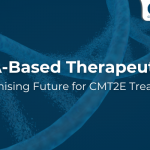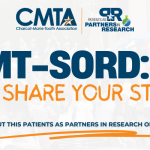- Gene Replacement Therapy in CMT4 Subtypes
 The Charcot-Marie-Tooth Association (CMTA) has announced a $240K investment in a groundbreaking gene replacement therapy for CMT4A, with potential applications for other types of CMT. This critical project is led by Xin Chen, MD, PhD, and CMTA Scientific Advisory Board ...Read more ...
The Charcot-Marie-Tooth Association (CMTA) has announced a $240K investment in a groundbreaking gene replacement therapy for CMT4A, with potential applications for other types of CMT. This critical project is led by Xin Chen, MD, PhD, and CMTA Scientific Advisory Board ...Read more ... - Nanoparticles for CMT1A, CMT1B, and CMTX1: A New Frontier in Gene Therapy
 In a groundbreaking three-year joint project between the Charcot-Marie-Tooth Association (CMTA) and the Muscular Dystrophy Association (MDA), researchers led by Alexia Kagiava, PhD, at the Cyprus Institute of Neurology and Genetics are pioneering the use of nanoparticles to develop gene ...Read more ...
In a groundbreaking three-year joint project between the Charcot-Marie-Tooth Association (CMTA) and the Muscular Dystrophy Association (MDA), researchers led by Alexia Kagiava, PhD, at the Cyprus Institute of Neurology and Genetics are pioneering the use of nanoparticles to develop gene ...Read more ... - Repurposing Drugs for CMT1A: An Encouraging Approach
 Charcot-Marie-Tooth disease type 1A (CMT1A) is the most common form of CMT, caused by having an extra copy of the PMP22 gene. This results in PMP22 overexpression, leading to excessive PMP22 protein in Schwann cells, which produce the protective myelin ...Read more ...
Charcot-Marie-Tooth disease type 1A (CMT1A) is the most common form of CMT, caused by having an extra copy of the PMP22 gene. This results in PMP22 overexpression, leading to excessive PMP22 protein in Schwann cells, which produce the protective myelin ...Read more ... - DNA-Based Therapeutics: A Promising Future for CMT2E Treatment
 Researchers at the University of Miami, supported by the Charcot-Marie-Tooth Association (CMTA) and its Strategy To Accelerate Research (STAR) and led by CMTA-STAR Advisory Board member Mario Saporta, MD, PhD, have made significant progress in DNA-based therapeutics. Their groundbreaking work ...Read more ...
Researchers at the University of Miami, supported by the Charcot-Marie-Tooth Association (CMTA) and its Strategy To Accelerate Research (STAR) and led by CMTA-STAR Advisory Board member Mario Saporta, MD, PhD, have made significant progress in DNA-based therapeutics. Their groundbreaking work ...Read more ... - CMT-SORD: Share Your Story
 CMT-SORD: What is Your Story? For many with CMT, the journey through diagnosis, acceptance, and living with this progressive disease can be isolating. Most research is conducted through a clinical lens that aims to improve symptoms. However, CMT does not affect ...Read more ...
CMT-SORD: What is Your Story? For many with CMT, the journey through diagnosis, acceptance, and living with this progressive disease can be isolating. Most research is conducted through a clinical lens that aims to improve symptoms. However, CMT does not affect ...Read more ...

Charcot–Marie–Tooth Association
Accelerating Research Empowering Patients









